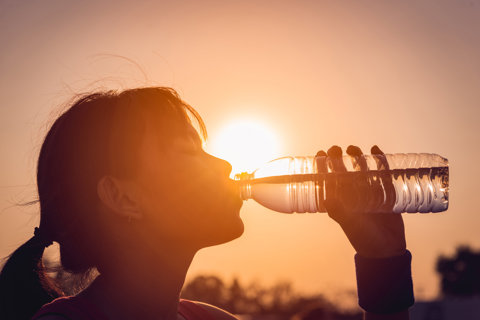
Heat health advice website views triple during summer heatwave in England
NHS reports viewing figures tripled for their heat exhaustion information online.
The NHS has reported that visits to the heat exhaustion advice webpage on their website has almost tripled in the past few days following rising temperatures in England.
The UK recorded its hottest day of the year so far on Tuesday (30th July) and yellow heat health alerts are in place for millions of people until Friday.
NHS England, who run the nhs.uk website, found that on 29th and 30th July there were 21,112 visits to their heat exhaustion page, compared with 7,838 over last weekend (27th and 28th July) – representing a 169% increase.
Searches peaked on Tuesday with 11,986 visits – an average of one visit every seven seconds.
Heat exhaustion does not usually need emergency medical help if you can cool down within 30 minutes but if it turns into heatstroke, it needs to be treated as an emergency.
For people living with diabetes, it is important to know what to look out for in hot weather and how to minimise risks to your diabetes self-management on holiday, or out in the sun.
Check glucose levels regularly, as increased physical activity and hot weather can increase the risk of hypos (hypoglycaemia, or low blood glucose levels).
Read DRWF Diabetes management in hot weather information

The NHS is urging the public to use services as they normally would– with NHS 111 services available for urgent needs, and 999 for emergencies.
Chief Nursing Officer for England Duncan Burton said: “We’ve seen a considerable increase in the number of people coming to the NHS website for heat-related health advice.
“The NHS website includes advice on how to stay cool, the symptoms of heat exhaustion, what to do if someone is affected and when to seek medical advice.
“People should continue to use 999 in life-threatening emergencies and NHS 111 – via the NHS App, online, or by phone – for other health concerns.”
Signs of heat exhaustion include tiredness, dizziness, headache, feeling sick, sweating, or clammy skin, cramps, fast breathing or heartbeat, a high temperature, being very thirsty and feeling weak.
If someone is showing signs of heat exhaustion, they need to be cooled down and given fluids. The NHS advises moving them to a cool place, removing unnecessary clothing, giving them a rehydration drink or cool water and cooling their skin with water, a fan or cold packs wrapped in a cloth.
If their condition doesn’t start to improve after 30 minutes of resting in a cool place, call 999.
The NHS website is the UK’s biggest health website with an estimated 2.1 million visits a day in 2023 from people seeking information and advice. It includes more than 4,000 pages and provides information about 990 medical conditions, as well other health services including applying for a free UK Global Health Insurance Card, finding a GP, and a pregnancy due date calculator.
Visit the NHS heat health advice page
I would like to make a regular donation of
I would like to make a single donation of
There are lots of ways to raise money to support
people living with all forms of diabetes.
Bake, Swim, Cycle, Fly ... Do It For DRWF!
Fundraise with us
Recent News


